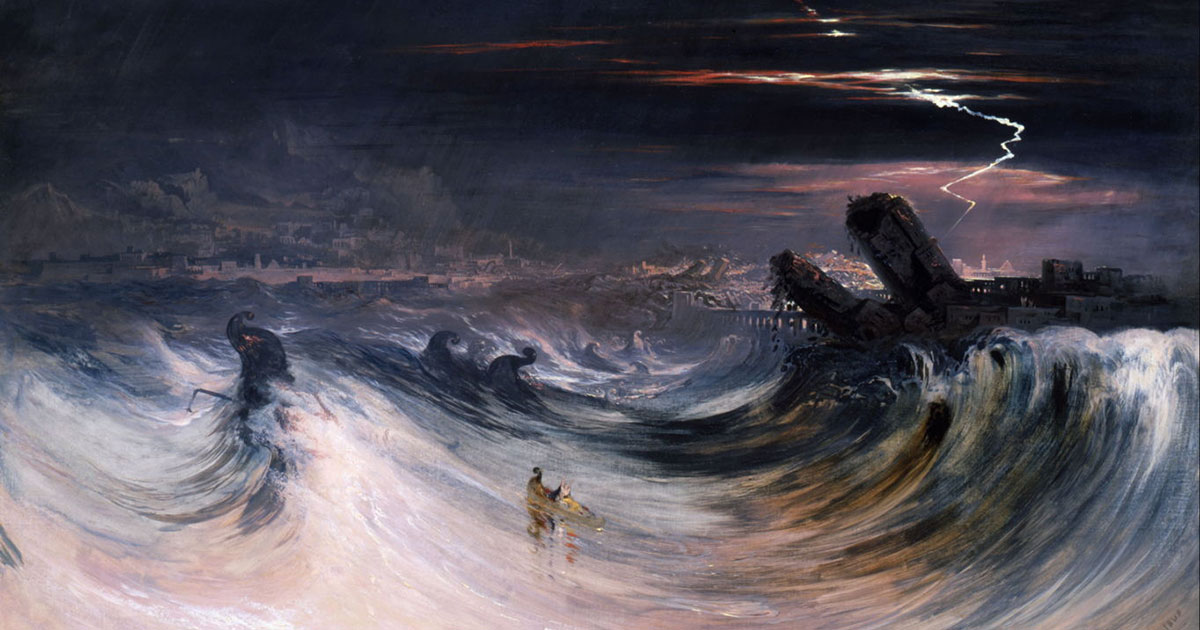Cleft Into Gigantic Disorder

John Martin - The Destruction of Tyre
Wuthering Heights is a more difficult book to understand than Jane Eyre, because Emily was a greater poet than Charlotte. When Charlotte wrote she said with eloquence and splendour and passion "I love", "I hate", "I suffer". Her experience, though more intense, is on a level with our own. But there is no "I" in Wuthering Heights. There are no governesses. There are no employers. There is love, but it is not the love of men and women. Emily was inspired by some more general conception. The impulse which urged her to create was not her own suffering or her own injuries. She looked out upon a world cleft into gigantic disorder and felt within her the power to unite it in a book. That gigantic ambition is to be felt throughout the novel - a struggle, half thwarted but of superb conviction, to say something through the mouths of her characters which is not merely "I love" or "I hate", but "we, the whole human race" and "you, the eternal powers . . . " the sentence remains unfinished. It is not strange that it should be so; rather it is astonishing that she can make us feel what she had it in her to say at all. It surges up in the half-articulate words of Catherine Earnshaw, "If all else perished and HE remained, I should still continue to be; and if all else remained and he were annihilated, the universe would turn to a mighty stranger; I should not seem part of it". It breaks out again in the presence of the dead. "I see a repose that neither earth nor hell can break, and I feel an assurance of the endless and shadowless hereafter - the eternity they have entered - where life is boundless in its duration, and love in its sympathy and joy in its fulness." It is this suggestion of power underlying the apparitions of human nature and lifting them up into the presence of greatness that gives the book its huge stature among other novels. But it was not enough for Emily Brontë to write a few lyrics, to utter a cry, to express a creed. In her poems she did this once and for all, and her poems will perhaps outlast her novel. But she was novelist as well as poet. She must take upon herself a more laborious and a more ungrateful task. She must face the fact of other existences, grapple with the mechanism of external things, build up, in recognisable shape, farms and houses and report the speeches of men and women who existed independently of herself. And so we reach these summits of emotion not by rant or rhapsody but by hearing a girl sing old songs to herself as she rocks in the branches of a tree; by watching the moor sheep crop the turf; by listening to the soft wind breathing through the grass. The life at the farm with all its absurdities and its improbability is laid open to us. We are given every opportunity of comparing Wuthering Heights with a real farm and Heathcliff with a real man. How, we are allowed to ask, can there be truth or insight or the finer shades of emotion in men and women who so little resemble what we have seen ourselves? But even as we ask it we see in Heathcliff the brother that a sister of genius might have seen; he is impossible we say, but nevertheless no boy in literature has a more vivid existence than his. So it is with the two Catherines; never could women feel as they do or act in their manner, we say. All the same, they are the most lovable women in English fiction. It is as if she could tear up all that we know human beings by, and fill these unrecognisable transparences with such a gust of life that they transcend reality. Hers, then, is the rarest of all powers. She could free life from its dependence on facts; with a few touches indicate the spirit of a face so that it needs no body; by speaking of the moor make the wind blow and the thunder roar. - Virginia Woolf, in 'Jane Eyre' And 'Wuthering Heights'
